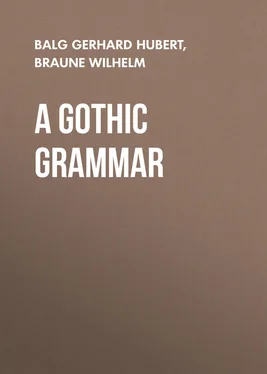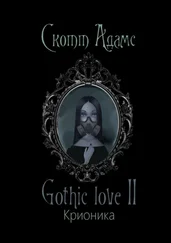Gerhard Balg - A Gothic Grammar
Здесь есть возможность читать онлайн «Gerhard Balg - A Gothic Grammar» — ознакомительный отрывок электронной книги совершенно бесплатно, а после прочтения отрывка купить полную версию. В некоторых случаях можно слушать аудио, скачать через торрент в формате fb2 и присутствует краткое содержание. Жанр: foreign_antique, foreign_prose, на английском языке. Описание произведения, (предисловие) а так же отзывы посетителей доступны на портале библиотеки ЛибКат.
- Название:A Gothic Grammar
- Автор:
- Жанр:
- Год:неизвестен
- ISBN:нет данных
- Рейтинг книги:3 / 5. Голосов: 1
-
Избранное:Добавить в избранное
- Отзывы:
-
Ваша оценка:
- 60
- 1
- 2
- 3
- 4
- 5
A Gothic Grammar: краткое содержание, описание и аннотация
Предлагаем к чтению аннотацию, описание, краткое содержание или предисловие (зависит от того, что написал сам автор книги «A Gothic Grammar»). Если вы не нашли необходимую информацию о книге — напишите в комментариях, мы постараемся отыскать её.
A Gothic Grammar — читать онлайн ознакомительный отрывок
Ниже представлен текст книги, разбитый по страницам. Система сохранения места последней прочитанной страницы, позволяет с удобством читать онлайн бесплатно книгу «A Gothic Grammar», без необходимости каждый раз заново искать на чём Вы остановились. Поставьте закладку, и сможете в любой момент перейти на страницу, на которой закончили чтение.
Интервал:
Закладка:
Note 4. The Gothic monuments show but few abbreviations; the holy names, guþ, frauja, iêsus, Χristus, ar always abbreviated. Abbreviations ar denoted by a stroke abuv the word, but in our texts the abbreviated words ar uzually printed in ful; as, gþ= guþ, fa, fins= frauja, fraujins. – For more on this point, s. Gabelentz-Loebe's grammar, p. 19 et seq.
Note 5. The Goths alredy had the Germanic runic letters before Wulfila. The names of these letters wer uzed also for the new characters. The names of the Gothic symbols, together with a few Gothic words and alfabets, ar preservd in a Salzburg-Vienna manuscript of the 9th century: W. Grimm, 'Wiener Jahrbücher der Litteratur 43', p. 4 et seq. Massmann, zs. fda. 1, p. 296 et seq. – The form of the names, however, is very corrupt. As to this, cp. A. Kirchhoff, 'Das Gotische Runenalphabet', 2nd edit., Berlin 1854; J. Zacher, 'Das Gotische Alphabet Vulfilas und das Runenalphabet', Leipzig 1855. – Of special importance is Wimmer's treatis on Wulfila's alfabet, as 'Appendix I' to his book: 'Die Runenschrift', Berlin 1887, pp. 259-274.
§ 2. Of the 27 characters two hav only numerical values, ( § 1, n. 2), a third, the χ, is retaind only in Greek foren words, especially in the name 'Christus', and denotes no Gothic sound. Hense there remain the following 24 characters whose fonetic values ar to be determind:
(a) Consonants:
p b f m w | t d þ s z n l r | k q g h ƕ j.
(b) Vowels:
a e i o u.
(c) Difthongs:
ei iu ai au.
In determining the fonetic values of these characters we ar guided by the following means: (1) The Gothic alfabet is based on the Greek alfabet; hense, the pronunciation of the Greek letters to be determind for the 4th century, must also be regarded as that of the Gothic letters so long as there is no proof to the contrary. (2) The rendition of the numerous Greek foren words and proper nouns by Wulfila. (3) The transliteration of the Gothic proper nouns in Latin documents and by Latin authors of the 4th-8th centuries. (4) The testimony of the cognate Germanic languages. (5) Fonetic changes and grammatical fenomena in the Gothic language itself permit us to draw conclusions about the nature of the sounds.
Note 1. Concerning the pronunciation of the Gothic letters, cp. Weingärtner, 'Die Aussprache des Gotischen zur Zeit des Ulfilas', Leipzig 1858; Fr. Dietrich, 'Ueber die Aussprache des Gotischen während der Zeit seines Bestehens', Marburg 1862; about the consonants, Paul, 'Zur Lautverschiebung', Beitr. 1, p. 147 et seq.
Note 2. An old testimony for the Gothic pronunciation in the Salzburg-Vienna MS.:

ubi dicit. genuit .j. ponitur ubi gabriel .g. ponunt et alia his sim̅ ubi aspiratione. ut dicitur gah libeda jah libaida diptongon ai pro e longa p ch q ponunt. – Cp. § 1, n. 5, and, for explanation, especially Kirchhoff, p. 20 et seq.
CHAP. II. THE VOWELS
a
§ 3. The Gothic asignifies as a rule the short a-sound [as in G. mann].
Note 1. Foren words and names; as, Annas, Ἀννας; Akaja, Ἀχαΐα; barbarus, βάρβαρος; aggilus, ἄγγελος; karkara, carcer ; lukarn, lucerna ; Kafarnaum, Καπερναούμ.
Note 2. Gothic names: Athanaricus, Ariaricus, Amalafrigda( Ammian. )
§ 4. Short ais very frequent both in stem-syllabls and in inflection. E. g.
(a) Stem-syllabls: agis, aw ; aljis, ' alius '; tagr, tear ; aƕa, ' aqua '; alan, to grow ; hafjan, to heav ; saltan, to salt ; haldan, to hold ; waldan, to rule ; fadar, father ; staþs, place . — ahtau, ' octo '; gasts, guest ; ƕaþar, ' uter '; awistr, sheepfold (OHG. au, ' ovis '; ahd. gr., § 219, n. 3); bandi, band ; barn, child ; saggws, song ; all preterits of the III. – V. ablaut-series: bar, I bore ; hlaf, I stole ; band, I bound ; gaf, I gave , etc.
(b) Inflections: daga(dat. sg., § 90), waúrda(nom. acc. pl., § 93), giba(nom. acc. sg., § 96), guma(nom. sg., § 107), haírtôna(nom. acc. pl., § 109); — blindamma, blindana, blinda, blindata(str. adj., § 123); — imma, ina, ita, ija, meina(prn.; § 150et seq.); — nima(1st pers. sg. prs. ind.); nimaima, nimaiwa, nimaina(1st pers. pl. du. and 3d pers. pl. opt., § 170); haitada(medio-passiv, § 170); sôkida(weak prt., § 184); – adverbs: -ba(as, glaggwuba), nêƕa, inna, ana, waíla, etc.
Note 1. Apocope of an unaccented abefore enclitics: þat-ist, þat-ei, þan-uh, þamm-uh, þan-ei, þamm-ei, kar-ist. – Also frêtand frêtum(prt. of fra-itan, to devour , § 176, n. 3).
Note 2. For ain the difthongs ai, au, s. §§ 21. 25.
§ 5. In a few cases ais long [as in E. father]. (Comp. Holtzmann, Altd. Gr., I, 3 et seq.).
(a) In foren words: Silbânus( Silvanus ), aurâli( orale ), spaíkulâtur( speculator ), Peilâtus, etc.;
(b) In the following Gothic words: fâhan(OHG. fâhan), to cach ; hâhan(OHG. hâhan), to hang ; þâhta(prt. of þagkjan, to think ); brâhta(prt. of briggan, to bring ); gafâhs, a haul ; faúrhâh, curtain ; gahâhjô, in order ; -gâhts, a going ; also þâhô(OHG. dâha), clay ; unwâhs, blameless (OE. wôh, wrong ).
Note. In the words mentiond under (b) âharose from anh( § 50, n. 1). Cp. also Litbl. 1886, p. 485.
e
§ 6. eis always a long, close vowel ( ê) approaching very much the sound of i[as in E. they].
Note 1. In Greek words η is regularly represented by ê; e. g., Gabriêl, Kêfas, aíkklêsjô, Krêta; – sumtimes also ι: Naên, Ναίν; Tykêkus, Τυχικός; aíloê, ἐλωί; likewise e: Jarêd, Ἰαρέδ.
Читать дальшеИнтервал:
Закладка:
Похожие книги на «A Gothic Grammar»
Представляем Вашему вниманию похожие книги на «A Gothic Grammar» списком для выбора. Мы отобрали схожую по названию и смыслу литературу в надежде предоставить читателям больше вариантов отыскать новые, интересные, ещё непрочитанные произведения.
Обсуждение, отзывы о книге «A Gothic Grammar» и просто собственные мнения читателей. Оставьте ваши комментарии, напишите, что Вы думаете о произведении, его смысле или главных героях. Укажите что конкретно понравилось, а что нет, и почему Вы так считаете.











